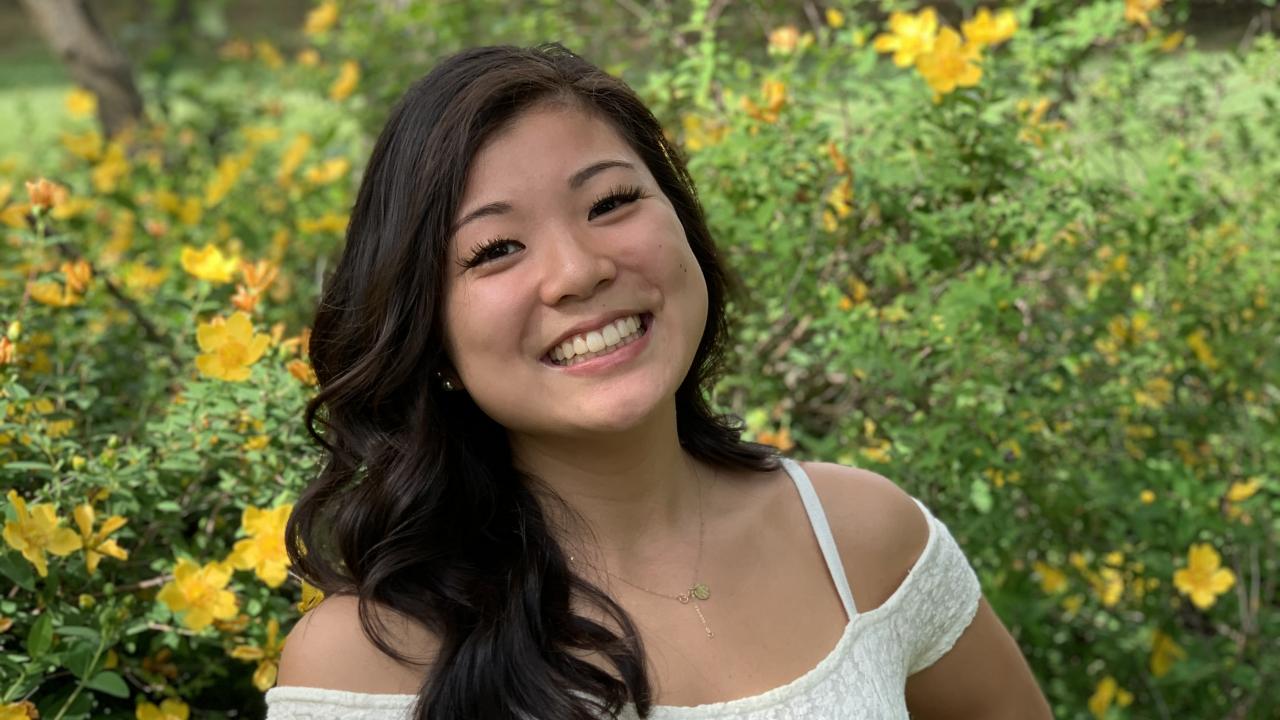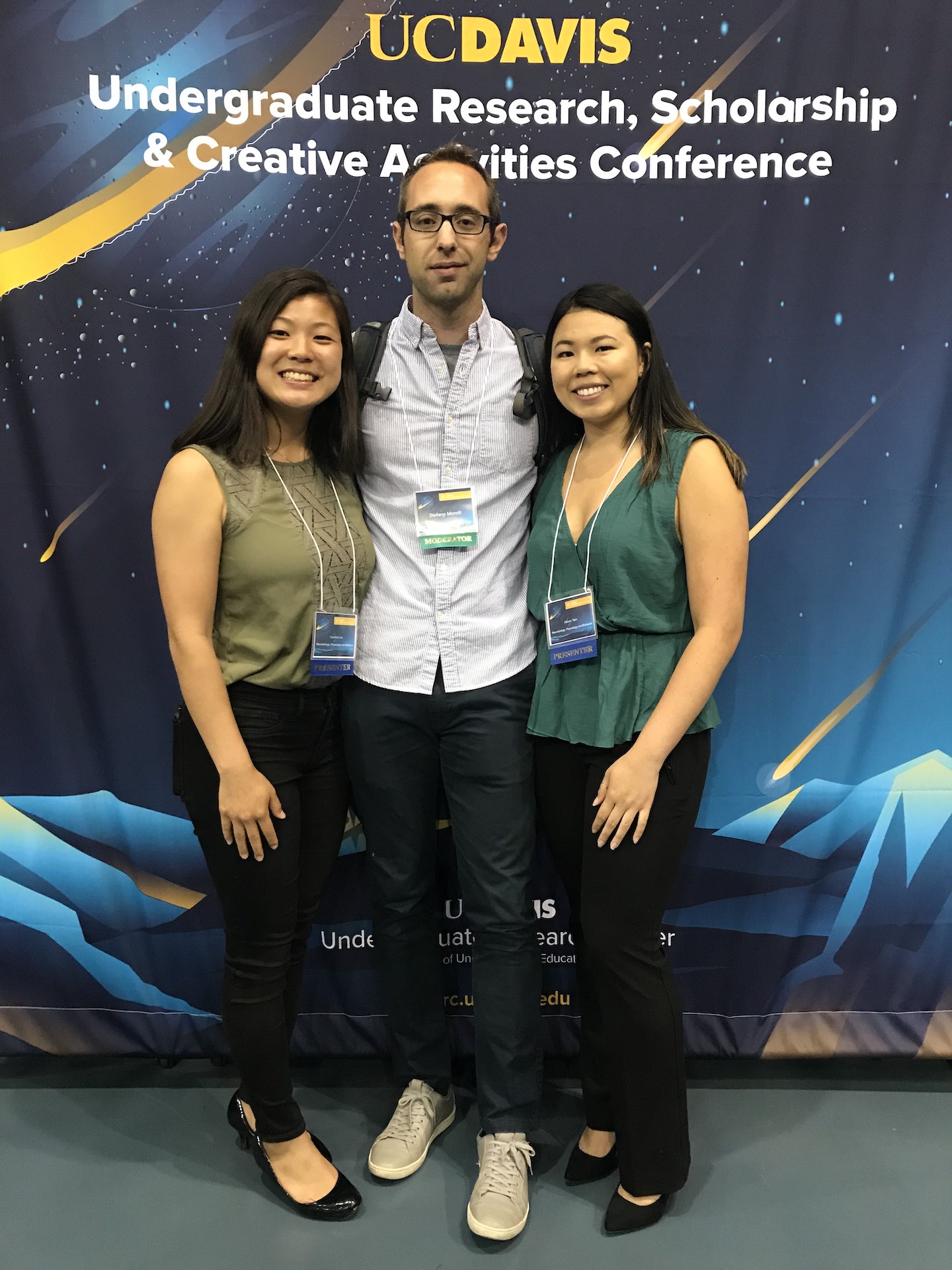
A Q&A with CBS Undergraduate Student of the Year and Ronald and Lydia Baskin Research Award Winner Caroline Liu
One of the recipients of both this year’s Ronald and Lydia Baskin Research Award and the Undergraduate Student of the Year award is Caroline Liu, a graduating senior majoring in neurobiology, physiology and behavior. The Ronald and Lydia Baskin Research Award recognizes graduating undergraduate students for excellence in biological sciences research. The Undergraduate of the Year award is given based on academic excellence, research activity and involvement in service.
Congratulations Caroline!
You can learn more about Caroline and her UC Davis experience in the Q&A below.
Why did you choose to attend UC Davis?
I attended UC Davis because I fell in love with the friendly and supportive community here. The students, staff, and locals are all
overwhelmingly welcoming and accepting. Also, it being a research university drew me in as I was extremely interested in getting involved with research during my time as an undergraduate. Overall, this university provides so many diverse resources for student success, and has helped me reach my potential as a student and a professional. During my time here, I have numerous opportunities to learn both inside and outside of the classroom.
Originally, I entered UC Davis without a career plan, majoring in biomedical engineering. I immediately joined Theta Tau, a co-ed

professional engineering fraternity to network, build professionalism, and meet like-minded peers. They became my closest support group; my four housemates I currently live with are actually my best friends, whom I met through the organization.
At Davis, I was constantly inspired by all the diverse, hard-working students around me who got involved with jobs, extracurricular, and volunteering while maintaining their studies. I remained determined to take advantage of all the opportunities at Davis and use my time productively. My first campus job was as a Microbiology Lab Assistant at the Veterinary Medicine Teaching Hospital, where I was honored to have the opportunity to work at one of the world's best veterinary departments.
Halfway through college, I developed a strong interest in clinical sciences, and decided to pursue medicine. I switched out of engineering into the College of Biological Sciences, and began volunteering at Bayanihan Clinic, a free student-run clinic that provided healthcare services to the underserved population of Sacramento. Here, I learned important lessons from brilliant medical students and physicians, as well as from the humbling experience of working with the underserved. It motivated me to pursue a healthcare profession, where I could help bridge the gap of health inequality.
In my spare time, I also began private tutoring for two high school students, and in doing so I got to meet two local families of Davis. They taught me about the community values of the city, and I really appreciated how they treated me as one of their own family members. It made me love the city of Davis even more, as I believe people here have such large hearts and appreciation of life.
UC Davis has been the best experience of my life, and I am proud of all I achieved in my time here. It would not have been possible without all of the resources and people at the institution, and I am forever grateful for my last four years here!
Describe your academic activities, research and student experience.
I sought out an opportunity in the Grandi Lab with an interest in research and cardiology, and was accepted as the first ever undergraduate to join their team. Grandi Lab borrows from physics, math, and computer science to build computational models to construct quantitative representations of heart cell function, in order to investigate the cellular bases of arrhythmia. I was intimidated to learn at the level of post-docs and PhD students, but diligently read the research papers at home to understand the practice problems I was given. I was determined to show they had not made a mistake in letting me join their team. I was then given my own project, where I focused on developing a computational models of rabbit ventricular myocytes in healthy and heart failure conditions, in order to study the signaling pathways and feedback loops of arrythmia and heart failure.
Academics always maintained a priority to me, and I managed to balance high performance in my classes with maintaining a healthy social life full of laughter and adventure. I learned to love my course content and respect my professors, and was always enthusiastic to teach my peers when they were confused on certain content. I have been inducted into three honor societies: Phi Beta Kappa, Tau Beta Pi, and Phi Sigma, based on my academic excellence and exemplary character. In retrospect, I wouldn't have changed anything about the amount of time I invested into both my classes or my friends.
How has philanthropic funding helped you in your educational pursuits?
Philanthropic funding from generous donors such as Ron and Lydia Baskin helps students achieve dreams that would otherwise be impossible. I have not received philanthropic funding in my past before, and I am extremely honored to be chosen as the recipient of the Ron and Lydia Baskin scholarship award.
I plan to use these funds to help afford my application process for physician assistant graduate programs. The application process is both extensive and expensive, as each program has a baseline application fee and further fees for supplemental essays. Additionally, the funds will help me cover travel costs if I (hopefully!) get invited for interviews that require me to fly to visit their programs. Being relieved of these costs helps me ease anxiety and focus on my current schoolwork and experiences, instead of worrying about affording future costs and paying back loans. I know that being able to afford the application process will then provide me the opportunity to receive high-quality training and higher education to become a talented healthcare provider, where I can give back to the community.
What are your goals for the future?
In my future, I plan to become a healthcare provider as a compassionate and trustworthy Physician Assistant (PA). Working in my research lab and volunteering at Bayanihan Clinic has taught me how awe-inspiring the field of science can be, and how rewarding the outcomes can be when we apply them to healing the community. I believe that education is the first step in preventative healthcare, and that a foundational understanding of our bodies and conditions is essential to managing one’s health. I also believe expanding medical education to the underserved populations may be an effective step toward fighting health inequality. As a PA, I’ll have the opportunity to serve on the frontlines of our healthcare system and work to build a better future for all patients. I am committed to serving as an inspirational role model to my peers and patients, and look forward to empowering the community toward success.
